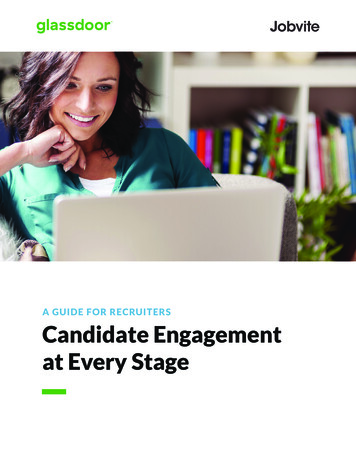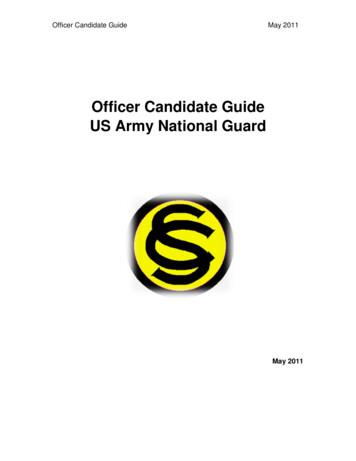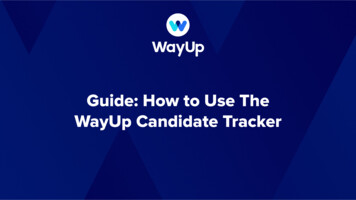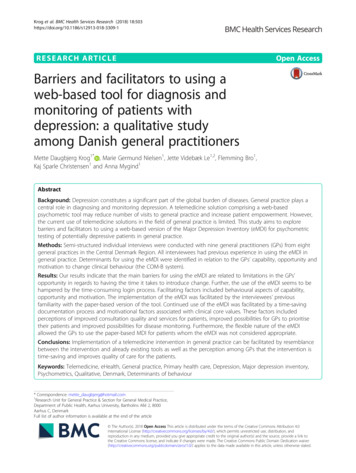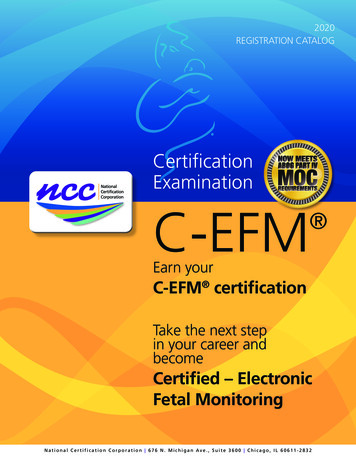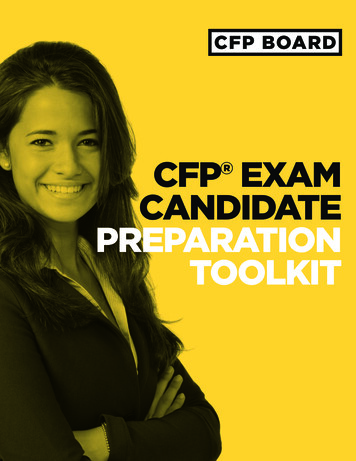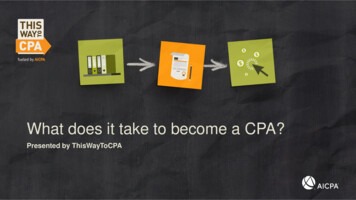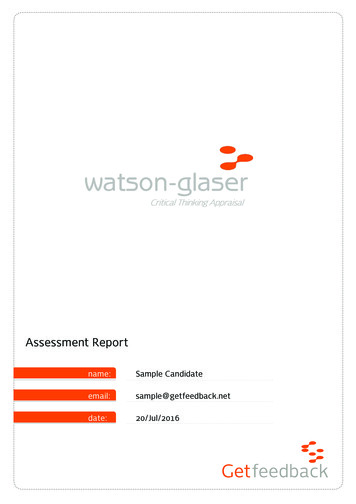
Transcription
Candidate guidePsychometric assessmentsCandidate guideOur assessments are used by employers to measure personality, ability, competency,and motivation at work.Page 1 - About psychometricsPage 2 - How to preparePage 10 - How to complete an assessmentPage 16 - Assessment question examplesAbout psychometricsPsychometric assessment grew in popularity throughout the 20th century, as a way for organizations tomeasure a candidate’s suitability for a role, in a scientific and unbiased way. In recent years, testproviders have been developing assessments that are more engaging for applicants, and provide moreinsight into the role and organization.Why organizations use psychometric assessmentsFor recruitment and selectionMany employers use psychometric assessments to help them identify the right person for the job. Theassessments provide an independent measure of your competencies, abilities, personality, andmotivation. This enables an employer to build a complete picture of you and assess your suitability for arole in an objective manner.Assessments are often used as one part of a multi-stage recruitment process, alongside applicationforms/CVs, assessment center exercises, and interviews.For developmentYou may be asked to complete psychometric assessments as part of your appraisal review or a learningand development program. By completing these assessments, you can gain valuable insight into yourstrengths and development areas. This can help drive further training and development plans.1 Korn Ferry 2021. All rights reserved.
Candidate guideHow to prepareWhether you've been asked to complete a psychometric assessment as part of a job application, or foryour professional development at work, the key to success is preparation.Practice improves performance: ability testsPutting time into practicing the kinds of questions you may face in ability tests is the best way ofmaximizing your performance and boosting your confidence.Try developing your reasoning skills via online practice tests, such as our own personality questionnaires.You could also work through relevant mathematics or language quizzes to improve your speed andaccuracy for numerical and verbal reasoning tests, or try completing logic puzzles to improve yourlogical reasoning ability.Be yourself: personality questionnairesThe beauty about personality questionnaires is that there are no right or wrong answers as it's all aboutyour own personal preferences. Just approach the questionnaire with an open mind, think about thequestion/statement carefully and respond openly and honestly.There's more to recruitment than psychometricsWe know that there's more to recruitment than just completing psychometric assessments, so we've puttogether some additional guidance on the different stages of the recruitment process in this guide.2 Korn Ferry 2021. All rights reserved.
Candidate guideTop tips for assessment dayYou've read up about how the assessments work and completed our practice assessments to test yourreasoning abilities, so what's left to prepare for your assessment day?Managing test anxietyWhen applying for a job, it is natural to feel some anxiety before and/or during the assessment process.While a little anxiety can be helpful to ensure you approach the assessment at a good pace, it isimportant to be as relaxed as possible when you sit down to complete the assessment.Simply having a good night’s rest and making sure you’ve had a good breakfast can have a positiveeffect on your ability to perform. Try to avoid rushing around before your assessment and make sure youhave left yourself enough time before the assessment begins, so you can approach it in a relaxed andfocused frame of mind.Avoid distractionsIf you are completing an assessment online from home or in the office, it is absolutely essential that youare not distracted or disturbed. Make sure you are in a quiet place where you will not be distracted bynoise or interruptions for the full duration of the assessment. Any distractions may have a direct impacton your score.Check your equipmentCheck your computer and internet connection before you're ready to start the assessment. Theassessments work independently of your connection speed and therefore a slow Internet connection willnot affect your test. However, you may wish to take our Internet speed test before you start to ensurethat your connection meets the minimum requirements. If you are unfamiliar with using a computerplease contact your administrator.Also, make sure you have paper, a pen or pencil and a calculator to hand as you may want to write downnotes or make calculations as you're working through the various questions.Read the instructionsOnce you're ready to start the assessment, take a couple of minutes to carefully read the onlineinstructions provided. If you're unsure of any of the instructions or have additional questions, pleasecontact your administrator before starting the assessment.Final practiceWhen you login to the assessment system, you will have the opportunity to complete a couple of finalpractice questions before you start the real assessment. Make sure you do this, as it will help familiarizeyou with the look, feel and functionality of the assessment system.The recruitment processThe recruitment process used by individual employers is likely to vary from one organization to another.Here's an overview of the different stages included in a 'typical' process to give you a general idea ofwhat to expect.Stages of recruitmentOnline screening questionsAs part of your initial application for a job, you may be asked to complete a set of online screeningquestions, which focus on the essential criteria required by the organization in order to apply for the job.These normally take the form of 'yes/no' questions, such as:3 Korn Ferry 2021. All rights reserved.
Candidate guideDo you have the right to work in the UK?Do you have a 2:1 or above degree in Mathematics?Do you have a passion for working in the software industry?If you answer 'yes' to all these questions, you should automatically progress to the next stage of theprocess. Answering 'no' to any of these questions may result in you being informed that you do not meetthe essential criteria for the job and are therefore not eligible to apply.CV and covering letter/online application questionsYou will generally be asked to submit a CV and covering letter or to answer a series of online applicationquestions. These application questions often ask you to describe situations in which you have performedtasks relating to the job or where you have demonstrated key skills and abilities that the employer islooking for. For example:Describe a time when you have provided excellent customer service.Outline an occasion when you used your initiative to achieve a successful outcome for anorganization.Describe a time when you worked effectively as part of a team.Your CV and covering letter, or answers to the application questions, will be assessed by theorganization against a set of pre-defined criteria relating to the role. This will decide whether yourapplication is progressed to the next stage of the process.Psychometric assessmentsSome employers, including many large-scale recruitment schemes, may require you to completepsychometric assessments as part of your application. Psychometric assessments are used to measureaspects of personality, ability, and competency:Ability tests measure your ability to perform or carry out different tasks. The majority of mainstreamability tests focus on verbal, numerical and logical reasoning.Personality questionnaires are used to assess your workplace behavioral style and preferences, i.e., howyou typically like to act. They are designed to measure those particular aspects of personality thatdetermine, or are predictive of, successful performance at work; how you handle relationships at work,your thinking style and how you manage tasks, and your feelings and motivations.Competency-based assessments focus on the skills and knowledge that you demonstrate in theworkplace.If you are asked to take part in an assessment center, psychometric assessments will often be included inthis stage of the process.Telephone interviewSome organizations like to have a brief telephone interview with you before inviting you for furtherassessment or a face-to-face interview. This type of interview is likely to be shorter and less in-depththan a face-to-face interview; however, it will typically explore your motivations for the job role,knowledge about the company, relevant skills and experience and possibly some competency-basedquestions.Use the interview tips and guidance section for advice on how to prepare.Face-to-face interviewThe main part of your job application will be a face-to-face interview. This is likely to take the form of a4 Korn Ferry 2021. All rights reserved.
Candidate guidecompetency-based interview, where the interviewers will ask you a list of standard questions. Everycandidate going through the interview process will be asked exactly the same questions; ensuring theprocess is objective and fair. You may be interviewed by just one person, or there may be a panel of twoor three interviewers.Use the interview tips and guidance section for advice on how to prepare.N.B. If you are asked to take part in an assessment center, the competency-based interview will often beincluded in this stage of the process.Assessment centerMany large-scale recruitment schemes will use assessment centers as part of their recruitment process.During the assessment center, you will be assessed alongside other candidates on a variety of differentexercises. Some of these exercises will involve you working individually, while some will assess yourability to work as part of a group. All of these exercises are designed to assess your suitability for the jobby looking at your skills and competence to perform the job role and your personality fit for theorganization and the job itself.Refer to our assessment center guidance for advice on preparing for assessment centers and theexercises involved.Some organizations will conduct a second assessment center, depending on the number of applicantsand the range of skills and abilities they need to assess.Final interviewSome organizations will conduct a final interview before they make any decisions. This is often anopportunity for them to explore your skills and experience further, perhaps looking into the strengthsand development areas they identified during your earlier interview or at the assessment center.As part of this final interview, you may be asked to deliver a presentation. You will receive thepresentation brief a week or more in advance of the interview to give you time to prepare. The brief willgenerally focus on a specific question or problem, or ask you to make recommendations on a particularcourse of action. The presentation will last between 10-30 minutes and will be followed by a questionand answer session with the interviewers.You may also be required to meet different members of the team at this stage so that they can get anidea for how well you would fit in with the existing team.Job offerThe final stage of the recruitment process is the job offer, where you will receive a final decision from thecompany on your application.ReferencesA job offer is typically dependent on you providing satisfactory employment references from previousemployers and/or your school/college/university. These references should demonstrate your ability to beable to perform the job, work effectively with others, and your reliability and commitment to work.5 Korn Ferry 2021. All rights reserved.
Candidate guideAssessment centersMany large-scale recruitment schemes use assessment centers as part of their recruitment process.During the assessment center you will be assessed alongside other candidates on a variety of differentexercises.Some of these exercises will involve you working individually, while others will assess your ability to workas part of a group. All exercises are designed to assess your suitability for the job by looking at your skillsand competence to perform the job role and your personality fit for the organization and the job itself.The advantage of taking part in multiple exercises in this way is that you have a much better chance todemonstrate your full range of skills and abilities. They are therefore a much fairer way of recruitingpeople than an interview alone.An assessment center can last for anywhere between half a day and three days. It will normally takeplace at the organization's premises but may be held at an external location.How to prepare for an assessment centerResearch the company, their market, and their competitorsCompanies want to hire people who can show interest in and enthusiasm for their organization, and whowant to be a part of it. Attending an assessment center without a basic understanding of theorganization and its products and services is simply bad manners.Most organization's website is a good starting point for your research. The kinds of information youshould be looking for are:How long has the organization been established?What are their products and services?What are their aims and objectives?How many offices do they have and where are they located?Do they have an international presence?What are their core markets?Are there any specific projects they are currently working on?Do they have any expansion plans?Have there been any mergers or acquisitions, or are any planned?What does the organization say about themselves - what is their company culture, and their ethicsand values?How well has the company been performing? Checking their share price is always useful.Who are their competitors? What sets this organization apart from their competitors?You are unlikely to find all this information on their website. Searching more widely on the internet and innewspapers/magazines, or consulting their annual report, are good ways of finding out as muchinformation as possible.Prepare your outfit ahead of the dayMake sure you have a suit or smart dress to wear to the assessment center. Even if you think thecompany dress code may be quite casual it is better to be overly smart, rather than risk appearing too6 Korn Ferry 2021. All rights reserved.
Candidate guidecasual. These are formal occasions and first impressions count for a lot. An employer will not think poorlyof you if you are too smartly dressed, but going too casual can give the impression that you haven'tmade sufficient effort - perhaps you also are casual about the job itself.Research the locationMake sure you know exactly where you are going and how long it will take to get there. Have a journeyplan and do a trial run if possible so you don't risk getting lost on the day. Being late creates a really badimpression. No matter how well you perform on the day being late may still cost you the job. Make sureyou have inquired about parking facilities in advance.Have the name and phone number of the contactIf you are running late, for any unavoidable reason, it is always good to have a phone number to callahead and advise of your delay. When you arrive at the organization, make sure you are clear who youare meeting with and have a clear understanding of the format for the day.Practice a firm handshake with eye contactConfidence and first impressions are very important during assessment processes. A limp handshakemay give the impression of being unassertive or shy. Make sure you make regular eye contact withpeople throughout the course of the assessment - this will give the impression of confidence and goodinterpersonal skills.Get a smart document wallet for your papersYou will need to make sure you print out and take with you:A copy of the job description and person specification.A timetable and outline of the day.A copy of your CV and covering letter.Any examples of work you want to show.Answers to any online application questions you have completed.Directions to the location and a map.The contact details of the person you are meeting.Prior research you have done on the company.A pen and paper.Practice your psychometric assessmentsMany employers will ask you to complete psychometric assessments as part of the assessment center.Please refer to our guidance on psychometric assessments for more information on these. It is also agood idea to try completing some practice assessments before the real thing.Be polite to everyoneRemember that everyone in the company will be aware of you and it is your job to impress them. Anyperceived slight to a receptionist or rudeness to an administrator may be reported back to theassessor(s). Be friendly and polite to everyone from the moment you get near the interview location. Donot ask a receptionist to photocopy your PowerPoint slides or try to persuade them to let you park in adisabled spot. Take responsibility for immaculate preparation so that you do not need to ask for help orfavors.7 Korn Ferry 2021. All rights reserved.
Candidate guideInterviewsCompetency-based/structured interviewsA competency-based interview is a structured form of interview where you will be asked a series ofstandard questions relating to the role. Your responses will then be assessed and scored by theinterviewers using a rating scale. They will have a list of points they are looking for you to cover and skillsand competencies for you to demonstrate. Every candidate will be assessed in the same way, using thesame criteria and the same rating scale. You can therefore be confident that the process is fair and youare being asked the same questions as all the other candidates in the process.Unstructured interviewsAn unstructured interview means that interviewers may ask you more open or broad ranging questions,depending on what particularly interests them about your CV or the experience you have. The questionsthey ask you may be different to those that are being asked of other candidates, depending on theparticular areas the interviewer wishes to address with you. You could also be asked questions that lookmore in depth into your strengths or any development areas an employer may think you have. Someemployers will use these as the final stage of the process, or smaller employers who don't have astandardized interview format may use them.How to prepare for an interviewThe companyYou are likely to be asked what you know about the company and your motivations for working forthem. Use the guidance in the assessment center section to help you research the organization.You should prepare an answer for why you want to work for the company. This could consist of any ofthe following points:The size of the company - for example, if working for a large company appeals to you, you could talkabout your desire to be part of an international or well-recognized organization.Career prospects - have a look on their website at the training scheme and development opportunitiesthat the company offers. Organizations often like you to emphasize your aspirations for a long-termcareer with the company.Opportunities to work internationally - research these opportunities on their website if this is somethingwhich appeals to you.Company achievements, success stories or new business wins - research these and emphasize yourexcitement at being part of a high-achieving company.Any particular commitments or pledges on the company website - for example, many companies haveInvestors in People certification; this demonstrates that the company has a good track record in staffdevelopment.The jobIt is really important to familiarize yourself with your own CV and covering letter and know these reallywell. You need to make sure you are able to talk through the specifics of your experience in relation tothe role. Take a copy of the job description and annotate it to show:Tasks you can confidently say you have experience of.Tasks you have limited experience of.Tasks you have knowledge of but have never actually done.8 Korn Ferry 2021. All rights reserved.
Candidate guideTasks which you have neither knowledge nor experience of.From this you can identify your key selling points, how you can add value to the company and whatmight make you stand out from other applicants. For those aspects of the job description where yourknowledge and experience are weak, think about how you might deal with questions about those on theday. Any research you can do into processes or skills that you are less familiar with will be helpful. Youwill be able to say that, although you have not done 'xyz' before, you at least know a little about it.You should now have a clear picture of how your skills and experience match the role you are applyingfor. You can now use this to answer the key question - 'why are you applying for this job?'As well as showing how you match the job, show your interest in working for the company and doing thejob. You need to convey enthusiasm and passion here, using phrases such as 'I would love to.' or 'I amfascinated by.' or 'I find.really exciting'.You, your skills, and experienceThis is your opportunity to sell yourself. You need to convince the interviewer that you are the bestperson for the job. However unnatural or boastful this seems, competition for jobs is tough and you needto make sure you stand out from the other candidates. To sell yourself effectively emphasize your uniqueselling points; these are skills and attributes you have that set you apart from the competition. You havealready identified your key selling points in relation to your experience so now think more broadly aboutyour personality, work ethic and values.Some examples of the qualities you might bring to a job include:Attention to detail - a precise and methodical approach to work.Organizational skills - being able to prioritize, multi task and manage time.Problem solving skills - using your own initiative, trying to find solutions independently before seekinghelp.Self-motivation - hard working, punctual, reliable, enthusiastic, and ambitious.If you are going to claim to have any of these qualities, you must have an example ready of when youhave demonstrated this.You may also be asked what you consider to be your weaknesses or development areas. Be careful howyou answer this question - it can be designed to catch you out. A good way to answer this is to think ofa potential weakness that could also be a strength. For example, 'I am something of a perfectionist. I setvery high standards for myself and others.' You then need to demonstrate how you have learned tomanage this trait to positive effect. For example, 'I have learned through more effective prioritization ofmy work to manage time effectively and focus on the most urgent things first.'Competency-based questionsIn a competency-based interview you will be asked a series of questions that look at your skills in certainareas. Examples might include your ability to work as part of a team, your planning and organizationalskills, or your attitude to customer service. These questions are likely to require you to look back at yourpast work experience and find examples of when you have demonstrated the skill they refer to. Theinterviewer might ask you 'Tell me about a time when you.'.It's fine to stop and think about your answer here. The thing to remember is that there isn't necessarily aright answer. It is just as important to show how you went about addressing the problem, as it is to talkabout the final outcome. Structure your answer like this:Describe the situation or problem you were faced with.Talk about the task you needed to perform to resolve the problem.9 Korn Ferry 2021. All rights reserved.
Candidate guideOutline the action you took to complete the task.Describe the details of the end result and why the action was a success.These are some examples of questions they may ask:Give us an example of when you have achieved excellence.Tell us about a situation where have you worked successfully as part of a team/or on a group project.Give us an example of when you have used your initiative to solve a problem/develop a new way ofworking in a previous job role.Give us an example of when you had to meet tight deadlines/work on a project with very stricttimescales.Tell us about a situation when you have resolved conflict at work.What has been your biggest achievement in your career to date?Follow up questionsIt is important to have some questions prepared to ask at the end of the interview. This will demonstrateyour enthusiasm and interest for the role and in the company.Some questions you may like to ask would include:What are the opportunities for training and development within the role?Tell me about the training program that might be available in my first year.What opportunities are there for progression within the company?Where does the organization hope to be in five years' time? Are there any expansion plans?Tell me about the team I would be working within, in terms of size and job roles.What is the next stage in the interview process? When might I hear the outcome?10 Korn Ferry 2021. All rights reserved.
Candidate guideHow to complete an assessmentThe prospect of completing a psychometric assessment can be rather daunting, so we've put together ashort guide for each of our assessments to give you an insight into what to expect. By familiarizingyourself with the types of questions you'll be asked and how the assessments work, you should feelmore relaxed and be able to put in your best performance when it's time to complete the realassessments.A guide to our assessmentsPersonality questionnaire - measures your behavioral preferences at work, focusing on how you preferto manage your relationships with others, your approach to tasks and your sources of energy andmotivation.Cognitive ability tests - measure your reasoning skills in interpreting written information and reports,using figures, data and statistics, and understanding of abstract or logical symbols.Competency-based assessment - measures your behavioral preferences at work in relation to themost relevant competencies for the job.Situational Judgment - designed to measure a variety of factors required to be successful in aparticular role (or set of roles) within an organization.Motivations - focuses on your values and drivers in the workplace, and measures the factors that helpstimulate and energize you in your daily working lives.360 - a competency-based feedback questionnaire that provides objective and honest feedback fromyour manager(s), team members and peers.Personality assessmentsPersonality questionnaires are used to assess your workplace behavioral style and preferences, i.e., howyou typically like to act. They are designed to measure those particular aspects of personality thatdetermine, or are predictive of, successful performance at work; how you handle relationships at work,your thinking style and how you manage tasks, and your feelings and motivations.Assessing personality has been proven to be an effective predictor of performance at work. This isbecause we tend to focus more on the kind of tasks we prefer engaging with, and as a consequence webecome much more skilled in these areas. Conversely, when operating outside of our preferred way ofbehaving, we may feel more challenged and be less inclined to persevere to develop high levels ofcompetence.How does it work?The questionnaire is completed online via our assessment system, and includes a series of statementsabout behavior at work. Your task is to rate each statement, indicating how true the statement is aboutyour behavior at work, or in other relevant situations.The statements are grouped into blocks of four. In each block, you are asked to rate each statement on ascale indicating whether the statement is 'completely untrue' to 'very true' of your behavior. You canrespond to the statements within a block in any order, and change a rating by clicking on another option.In each group of statements, you should avoid giving the same rating to more than one statement. If youdo give the same rating to several statements you are then asked to put these in rank order.Once you have moved on to a new block, you are not able to return to a previous one. There is no timelimit for the questionnaire but you are encouraged to give your immediate responses.The personality assessment normally takes approximately 25 minutes to complete.11 Korn Ferry 2021. All rights reserved.
Candidate guideFeedbackFollowing the completion of a personality assessment, you should receive feedback from the recruiter,hiring organization or your employer. Even if it isn't initially offered, don't be afraid to ask for feedback asthis will enable you to discuss what the questionnaire measures, your responses and how it all applies toyour day-to-day work.Cognitive ability testsCognitive ability tests measure your reasoning skills in interpreting written information and reports, usingfigures, data and statistics, and understanding of abstract or logical symbols.How does it work?Ability tests measure your ability to perform or carry out different tasks and have been found to be thestrongest predictor of future job performance. The tests most commonly used are:Verbal reasoning - these are designed to measure your ability to interpret verbal information andreach correct conclusions. Verbal reasoning is important for any work involving the communication ofideas or the understanding of written information. It can also be important for work requiringanalytical thinking.Numerical reasoning - these are designed to measure your ability to analyze and draw inferencesfrom numerical information and data. Numerical reasoning ability is important for a variety of roleswhere working with data is key.Logical reasoning - these are designed to test your ability to analyze abstract information and applythis in determining outcomes and patterns. Logical reasoning abil
Whether you've been asked to complete a psychometric assessment as part of a job application, or for . If you answer 'yes' to all these questions, you should automatically progress to the next stage of the . Candidate guide competency-based interview, where the inte
